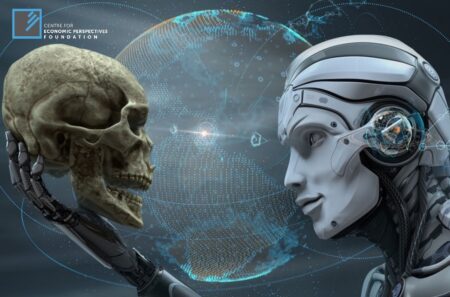Nowadays it seems borderline impossible to spend even a few hours without coming across the subject of “Artificial Intelligence”. There is just way too much talk, hype, arguments, doomsday prophecies or bold optimistic statements on how this or that technological advancement or tool, or AI in general is going to change or even shape the future decades. It should be noted, though, that not all of the hype is unfounded. As any new technology’s history shows, the growth is anything but linear. Since the last time I wrote on the subject half a year ago, the landscape of the entire tech sector, mainly due to advancements in AI, has changed considerably. Over the course of a few months ChatGPT, the most advanced AI language model yet, has become a global phenomenon of the scale of Facebook, Google or Netflix. While less than a year ago an engineer at Google was afraid their language model is going sentient, OpenAI’s ChatGPT can now write 25,000-word strong pieces of work, pass the most prestigious universities’ admission and academic tests, write computer codes and perform a much wider variety of tasks if given the correct instructions. Microsoft was the quickest to react, investing $10 bln for a stake in OpenAI that values the company at $29 bln. As the global leader of workplace software, Microsoft plans on making the lives of hundreds of millions of people much easier by using AI’s capabilities in their “365 copilot”, a tool designed to improve the everyday use of all Microsoft products including Word, Excel, PowerPoint, the search engine Bing and the much-maligned web-browser Edge, which still has not been able to get anywhere near to Google Chrome’s dominant position. Perhaps AI will give Edge the edge here.
While improvements in any technology are welcome news for humanity, questions arise on the multilayered consequences of what we are witnessing right now. Putting aside all the apocalyptic predictions partially inspired by movies like the Terminator or the Matrix, a much more practical and mundane global issue bothers most, if not all who have at least a vague idea on what new AI technologies are capable of.
The technological advancements of the past, such as cars, the production line, the internet or any other notable invention you can think of replaced redundant processes and made the world more efficient. Yet all these advancements mainly replaced and automatized the low-skill demanding and low-paid jobs. People started switching farms to factories more than a century ago, with much better and more stable pay and working conditions. The internet created hundreds of new well-paid professions out of nowhere.
However, what AI does, and does very well, is the set of tasks performed by relatively higher-paid portion of the population. The so-called white‑collar employees have now more to worry than at the time of any other invention. Writing code, trading securities, creating written or graphical content are all tasks that AI handles magnificently, while performing much poorly on the seemingly primitive, trivial tasks that any toddler completes with relative ease. Thus, the people whose jobs are at stake, and we are talking here about 300 million people by Goldman Sachs’ analysts’ estimates, are likely to end up worse off if the tasks they perform at work are trusted to AI.
And yet “affected”, the word used by Goldman Sachs in their report, does not necessarily mean replaced. Humanity has a long and successful history of adapting to anything the world or the environment throws at it. Those who understand the importance of new tools and adapt quickly will get a competitive edge, using AI to their advantage instead of watching it steal their jobs away. Calculators made humanity as a whole much more productive, as did computers later on and the internet after that. Not only did all these tools alter almost every single profession you can think of, but they also created entire fields and subsectors with millions of employees.
Another group of people that feels it might end up on the wrong side of this breakthrough are artists: painters, writers, musicians, actors, etc. Around the same time as ChatGPT was revealed and became insanely popular, AI-generated images swamped the internet. While also involving much deeper implications on the subject of morality (you can put someone’s face on a completely different picture and with frightening ease and realism), these generative models do represent a formidable competitor to traditional artists.
It might sound hopeful or even naïve here, but there is a chance that the ability to create high‑quality art and convincing, deep texts on a whim will cause our society to put a higher value on actual authentic work. As much as we illegally stream movies or songs, billions of people are still willing to pay for subscriptions for the same service they might have gotten for free. Handmade bags are bought at much higher prices precisely due to the fact that they are handmade, due to the human effort that went into their creation.
If we were to single out one constant throughout our history, it would have been change. Humanity is evolving constantly, and so do evolve the everyday tasks we perform and the way we perform them. AI is simply the latest step in the million-years-old process we call “evolution”.

